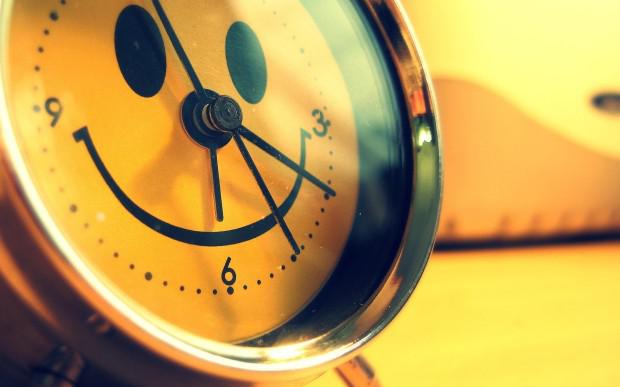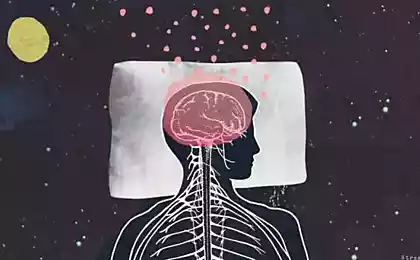1083
10 of the most interesting and surprising facts about sleep
Science sna
Today, on World Sleep Day in different countries held conferences and other events devoted to this crucial part of life. And we offer a selection of reading the facts about sleep that seemed to us the most interesting.
1. Why did you wake up screaming
Night terrors - a sleep disorder associated with abnormal physical movements, behaviors, emotions, perceptions and dreams. With the nightmare confused easily, but the only similarity is that the one and the other occurs during sleep.
At night the fear of people do not realize what is happening to them. The main difference of the night for fear of the nightmare is that in the first case, the person wakes up in part and in the second - continued to sleep. Furthermore, they occur at different phases of sleep. The most common fears arise between midnight and two o'clock in the morning, and during the afternoon nap.
During an attack of night terrors man suddenly straightens up and starts to cry, often something quite meaningful like "They will kill me!" The person sleeping is distorted with rage, and people seem to protect themselves from an unseen threat, or is afraid of something like worms in bed . Heartbeat - palpitations, perspiration on the body, the pupils - expanded. This state can last from ten to twenty minutes, and if the state of chronic, the seizures can occur up to 16 times a night.
A distinctive feature of night terror is that it is impossible to influence people. In fact, to intervene even dangerous - people nekontroliruem. Most people in the morning absolutely do not remember anything about the night the incident. Well only that they then fall asleep easily - in contrast to the nightmare.
Most often suffer from night terrors boys from five to seven years, but this girl is also subject to, though less often - according to statistics, about 17% of young children experience night terrors. As a general rule, as they grow older night terrors occur less often, and then completely pass.
But in addition to age, other factors - the cause of night terrors can be emotional stress, stress, fatigue or conflict. Also, the reason may be related to post-traumatic stress disorder, generalized anxiety disorder or sleepwalking.
From nightly fears helps psychotherapy - the fact is that the stresses of life should be reduced to a minimum.
2. Optional sleep much - just enough to believe that you are well vyspalis
New research suggests that there is a placebo effect of sleep: just believe that you slept well enough to be productive and energetic during the day. Especially well this technique works when people say that they slept well, any reputable psychologist or a doctor.
The experiment was conducted on a group of seniors. Students spoke briefly in lectures about the nature of sleep, and then connect them to the equipment, which supposedly should give researchers information about the quality of their sleep last night (actually the equipment simply measures the brain frequency). Then one of the experimenters allegedly coefficient calculated how well the students slept. Those who said they slept well, the tests performed better and faster than those who said they slept poorly.
Of course, if students stop to sleep at all, this technique will not work. The effect is rather similar to the other, we already know the effect: If a man say that he will cope with the task, he probably really cope with it, and if you set it up in advance to failure, then the probability of failure will increase.
3. Only 3% of people are able to feel normal, if not sleep more than 6 hours sutki
Sleep - something purely individual, so that the sleep time for which a person is fully poured, also depends on the person. There are two factors that affect the sleep time: according to research by scientists from the Department of Medicine at the Harvard School, is the age and genetics.
Genetics not only affects how much sleep you need, but also the structure of sleep and wake-up time as well as your preferences for certain tasks at different times of the day. Most adults need about eight hours of sleep a night, and a very small percentage of people (about 3%) can be productive during the day, emptying the entire six hours - that they owe to their genetics.
Generally, the older you get, the less you need to sleep. We give a short list of how many hours on average to sleep people of different ages:

Today, on World Sleep Day in different countries held conferences and other events devoted to this crucial part of life. And we offer a selection of reading the facts about sleep that seemed to us the most interesting.
1. Why did you wake up screaming
Night terrors - a sleep disorder associated with abnormal physical movements, behaviors, emotions, perceptions and dreams. With the nightmare confused easily, but the only similarity is that the one and the other occurs during sleep.
At night the fear of people do not realize what is happening to them. The main difference of the night for fear of the nightmare is that in the first case, the person wakes up in part and in the second - continued to sleep. Furthermore, they occur at different phases of sleep. The most common fears arise between midnight and two o'clock in the morning, and during the afternoon nap.
During an attack of night terrors man suddenly straightens up and starts to cry, often something quite meaningful like "They will kill me!" The person sleeping is distorted with rage, and people seem to protect themselves from an unseen threat, or is afraid of something like worms in bed . Heartbeat - palpitations, perspiration on the body, the pupils - expanded. This state can last from ten to twenty minutes, and if the state of chronic, the seizures can occur up to 16 times a night.
A distinctive feature of night terror is that it is impossible to influence people. In fact, to intervene even dangerous - people nekontroliruem. Most people in the morning absolutely do not remember anything about the night the incident. Well only that they then fall asleep easily - in contrast to the nightmare.
Most often suffer from night terrors boys from five to seven years, but this girl is also subject to, though less often - according to statistics, about 17% of young children experience night terrors. As a general rule, as they grow older night terrors occur less often, and then completely pass.
But in addition to age, other factors - the cause of night terrors can be emotional stress, stress, fatigue or conflict. Also, the reason may be related to post-traumatic stress disorder, generalized anxiety disorder or sleepwalking.
From nightly fears helps psychotherapy - the fact is that the stresses of life should be reduced to a minimum.
2. Optional sleep much - just enough to believe that you are well vyspalis

New research suggests that there is a placebo effect of sleep: just believe that you slept well enough to be productive and energetic during the day. Especially well this technique works when people say that they slept well, any reputable psychologist or a doctor.
The experiment was conducted on a group of seniors. Students spoke briefly in lectures about the nature of sleep, and then connect them to the equipment, which supposedly should give researchers information about the quality of their sleep last night (actually the equipment simply measures the brain frequency). Then one of the experimenters allegedly coefficient calculated how well the students slept. Those who said they slept well, the tests performed better and faster than those who said they slept poorly.
Of course, if students stop to sleep at all, this technique will not work. The effect is rather similar to the other, we already know the effect: If a man say that he will cope with the task, he probably really cope with it, and if you set it up in advance to failure, then the probability of failure will increase.
3. Only 3% of people are able to feel normal, if not sleep more than 6 hours sutki

Sleep - something purely individual, so that the sleep time for which a person is fully poured, also depends on the person. There are two factors that affect the sleep time: according to research by scientists from the Department of Medicine at the Harvard School, is the age and genetics.
Genetics not only affects how much sleep you need, but also the structure of sleep and wake-up time as well as your preferences for certain tasks at different times of the day. Most adults need about eight hours of sleep a night, and a very small percentage of people (about 3%) can be productive during the day, emptying the entire six hours - that they owe to their genetics.
Generally, the older you get, the less you need to sleep. We give a short list of how many hours on average to sleep people of different ages:
- neonates (from one month to two) - 10, 5 to 18 hours;
- infants (three to 11 months) - from 10 to 14 hours;
- small children (from one year to three years) - from 12 to 14 hours;
- children of preschool age (three to five years) - from 12 minute to 14 hours;
- children (five to 12 years) - from 10 to 11 hours;
- teenagers (from 12 to 18 ti s) - 8, 5 to 9, 5 hours;
- adults (from 18 years up to the end of life) - from 7, 5 to 8, 5 hours.
4. Hungarian soldiers had not slept for 40 years and in excellent chuvstvoval
Paul Kern was a Hungarian soldier who participated in the First World War. He was an excellent soldier and fought, even when all the others were killed by soldiers from his company, for which he was awarded the medal. Despite their martial skills, he also received a gunshot wound that was to kill him, but Paul survived.
Paul was shot in the head and part of his brain was damaged. The bullet destroyed a part of the frontal lobe - a wound would have killed anyone. But the only thing that has changed in the life of Paul after the injury - he could not sleep. Generally.
The doctors carefully examined it and could not understand how he managed to survive. In fact, the inability to sleep is the only problem of the soldier. Hypnotics and sedatives pills did not help. It may sound terrible, but Paul did not suffer - part of his nervous system was also destroyed. The man did not take depletion and assured everyone that feels great. Kern had not slept for 40 years - until his death in 1955, the year.
5. Your dreams really affect your real zhizn
According to studies, the content of our dreams reflect our real relationship with other people while you are awake - for example, a matter of controversy and doubts the next day. Thus, dreams can predict the future behavior of couples, especially intimate relationships.
The researchers asked more than 60 men and women to record details of their dreams as soon as they wake up and keep a personal diary and pay special attention to the records relating to the relationship with their other half.
If people saw in your sleep partner, then the next day it leads to problems in the relationship, and then dreams in which there was a conflict with a partner, followed by serious difficulties in the relationship. If the dreamer in the dream changed the second half, it led to a decrease of love and trust, and the effect is kept for several days.
However, not all results have been negative: those who in a dream saw something relatively pleasant partner, spent more time with him and approached him in real life.
However, researchers are not quite clear whether the subjects acted unconsciously influenced by dreams, or their actions were motivated by an analysis of his dreams - all the dreams they can then read in the diary and rethink.
6. Why did you wake up five minutes before the operation budilnika
The internal clock of your body just as good, if not better, as the mechanical clock. In the center of the brain is the accumulation of nerves called the nucleus suprahiazmalnoe supervising body clock - the circadian rhythm. It defines the periods of sleepiness and vitality, control blood pressure, body temperature and a sense of time.
In fact, our body - perfectly tuned machine, and this machine likes predictability: the work of the body is most effective when there is a routine sequence. So if you fall asleep and wake up at the same time for several days, the internal clock adjust to this schedule.
Sleep-wake cycle is regulated by a protein PER. Protein level rises and falls throughout the day, reaching a peak in the evening and at night fall. When the PER is low, your blood pressure falls, heart rate slows down, and thinking becomes vague - you become drowsy.
If you wake up every day at the same time, the body learns to produce enough PER at the right time - about an hour before waking up with the level of PER body temperature and blood pressure begins to rise. To prepare for the stress of waking body produces a cocktail of stress hormones - cortisol.
That's why you wake up before the alarm. In fact, your body hates the Service - for it is a rude awakening is stress, shock. Alarm negates all the work of your body - it prevents it from waking up slowly, naturally.
By the way, if you do not wake up to an alarm clock, you probably will not fill up or go to sleep not on schedule. For example, if you get up at different times on weekdays and weekends, the "reset" setting of the internal clock. No schedule your body does not know when to wake up, so when the alarm goes off, you feel stunned and annoyed.
You press the snooze button, and because your body is awake, even under stress, subsequent REM sleep even more confuses the internal clock. Hormones that help you fall asleep, mixed with hormones that help you to wake up - the body is confused, and with each repeated wake-up call is only getting worse. So that morning trills - this is the worst way to start the day.
7. Sleep on your left side can save you from izzhogi
Acid indigestion or heartburn - a burning sensation in the chest. The reason for this unpleasant phenomenon is the regurgitation of stomach acid contact. Originating in the chest, a burning sensation may spread to the neck, throat, and even the jaw. Heartburn may result in the development of gastroesophageal reflux disease.
Most of us are familiar with this unpleasant feeling, but keep in mind - sleep on the left side of the body can help to cope with heartburn, while sleeping on the right will only exacerbate the situation.
Presumably, this is because while sleeping on the right side of the circular muscle that prevents the penetration of food residues from the stomach into the esophagus, relaxes ceases to perform its function, and the acidity of the esophagus thus increasing.
8. Using brain scans can spy on you snitsya
The scientists were able to develop a technique of decoding brain impulses, allows us to understand the category to which your dream, up to 60%.
The fact that in our dreams often repeated the same visual images, such as "tree" or "person." Researchers have identified about 20 major categories developed separately for each participant. Note that items such as, for example, the "ice pick", "key" and "piston" belong to the same category - "guns».
Three volunteers were asked to look at pictures from the Internet, corresponding to these categories, and at this point their brain activity was monitored. Then the obtained data were entered into a specially designed computer program then scans continued even during sleep. Researchers led by neurologist Yuki Kamitani at this point monitored the brain activity of subjects. As soon as possible to determine what the volunteers saw in a dream, they were awakened and asked to describe their dreams.
So far, the system is far from perfect and can only guess the visualization of a wide range of categories. Decoding the same items dream at the moment is not possible.
9. If you suddenly awaken a sleepwalker, nothing wrong with him sluchitsya
There is a common myth that if you wake a sleepwalker, he can survive the strong shock, and it may even have a heart attack. In fact, such a wake-up from sleep is in itself dangerous. But if you happen to see a man who walks in his sleep, it's better not to wake him - for him and for you.
While in the Statement of awakening a person suffering from sleepwalking, nothing dangerous to his health is not, it is very likely that a person could be injured by surprise himself and harm to the one who woke him up. Normally lunatic starts to go in the third stage of REM sleep, also known as "REM sleep." At this stage, very deep sleep and wake up at this time is difficult, though possible. However, the awakening may lead to cognitive impairment (scientists call this state "sleepy inertia"), which can last about 30 minutes.
Experts in the field of disorders associated with sleep, argue that a man suddenly awakened from a deep sleep, may be very frightened, could not understand. He simply can not find you, kick or strike. But even if such a person did not respond aggressively, he still may be harmful to you and to myself many sleepwalkers dream go to the kitchen to cook, or even try to get in the car with all the ensuing consequences.
Instead of walking in a dream to wake the person, experts advise gently and slowly bring him back to bed.
10. Lack of sleep spoils you personally zhizn
Poor sleep dramatically affects your everyday relationships in pairs usually one of the partners, which is less often enough sleep or dreaming nightmares become grouchy, begins to complain about life and blaming the other is that it does not appreciate or do not pay enough attention. Researchers from the University of Berkeley wondered why this is so.
The scientists asked 60 couples of all ages, from 18 to 56 years, keep a sleep diary. Participants had to write every morning, how well they slept, and added that they feel towards their partner. Also during the settlement of disputes in the family was conducted video recording. Those people whose sleep was worse are much more impatient and irritable.
There are several reasons why a person can not sleep - such as snoring or loud noises from the next room that prevent sleep. And some people are proud of the fact that sleep 4-5 hours a day and can go without sleep for a long time.
It was recalled that the full sleep is extremely important for the physical and mental health, and to feel vigorous and active person needs from 5 to 8 hours of sleep every night.
Today, one in three people in the world suffering from insomnia. Normally poured only 40% of the population.
via factroom.ru
Worst hotel in the world has become worse
Ice worms - a very strange creatures that live in the ocean






























